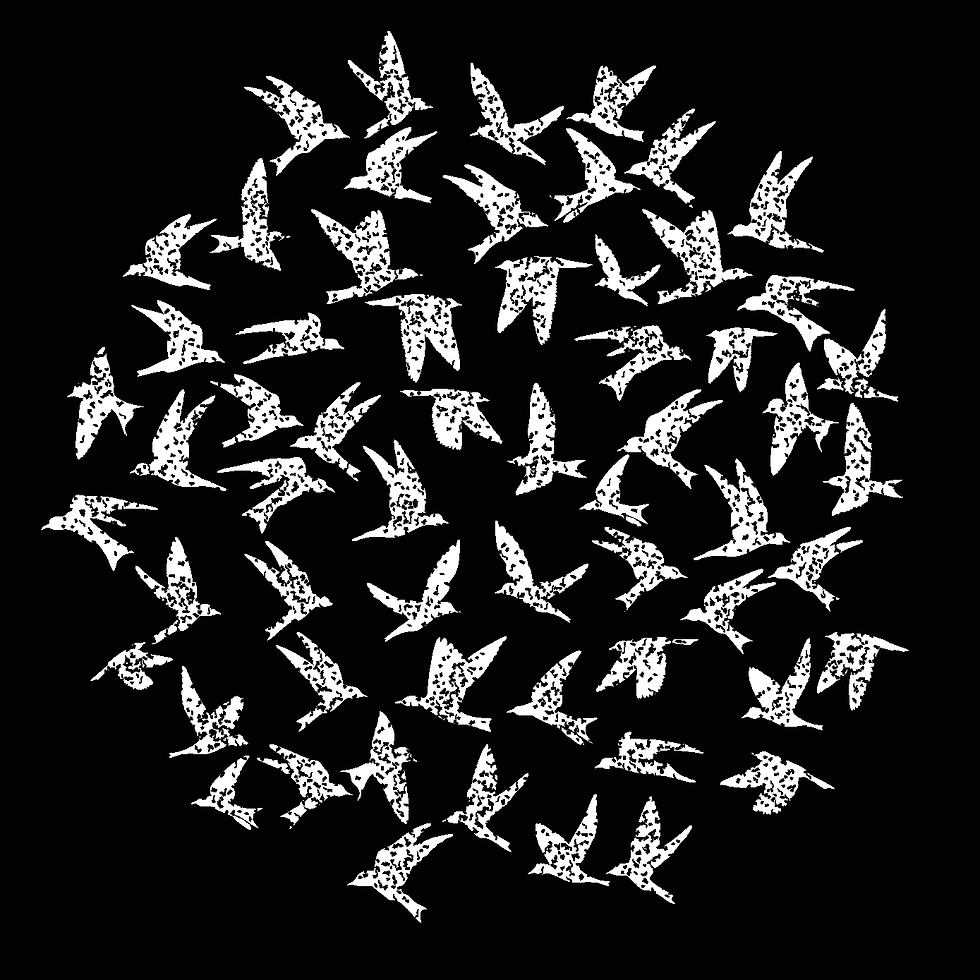Zindan Central Cemetery - Part 5
- peterfdavid
- Mar 25, 2023
- 4 min read

The second deputy and his motorcycle brigade was the first of several contingents to arrive from the capital the morning of the Great Khozem’s death. Soon a motion camera crew arrived to make preparations for filming the funeral rites and ceremonies. Next, a throng of workers arrived in trucks loaded with the flags, banners, and scaffolding that would provide a patriotic backdrop for the ceremony.
The motorcycles and trucks were speckled with the starlings’ droppings minutes after they had come through the gate. The film crew, immediately perceiving the problems they would encounter filming under the murmurations, had already unpacked the coverings and canopies they had brought in case of rain. I had sent the theremin trucks back into the cemetery and escorted the second deputy to the east gate office which was to be the coordination center for Khozem Vladisher’s funeral spectacle.
By mid-morning, the coordination office had transformed from an orderly place intended to direct the Khozem’s funeral proceedings to an emotional torture chamber where different parties took turns hurling insults and blame at me.
The second deputy ignored my attempts to show him copies of the correspondence I had sent to the capital that documented the problems with the murmurations. He instead began voicing ominous conjectures about the appropriateness of my family’s award of the tender to bury the Great Khozem. He wondered aloud whether we indeed had lived up to the responsibilities that a Zindan funeral concession demands. Whether my family belonged within the wall at all.
The film crew took their turn next, explaining how it would be impossible to operate their cameras, given the conditions in the cemetery. The dismal lighting caused by the birds’ obscuration of the sky ruined their plans to film in daylight. The constant rain of droppings posed a grave threat to the lenses and mechanisms of their cameras. “We would be lucky,” the film director said, “if we captured even twenty percent of the ceremony before the cameras were inoperable.”
The workmen who were responsible for building the stage and the scaffolds that would display the flags and banners shouted at me next. They had already unfurled one of the brilliant red and black banners that would hang from scaffolds behind the Khozem’s casket. Only ten minutes of exposure to the environment of the cemetery had rendered the cloth unusable. Large white circles and ovals of bird droppings blemished the beautiful red velvet. The crew leader took his time showing me how he tried to clean the spots off the fabric. How every type of brushing and rinsing he could imagine did nothing other than spread the stain and damage the fabric. The banners and flags could not be displayed.
Someone brought a radio into the office and tuned it to the national news channel. The reporter described the progress of the Great Khozem Vladisher’s casket through the capital, and onto the funery train. The train would make seven stops on its way to Zindan, giving our population one last chance to view the great man. The train would arrive in Zindan Central Cemetery in two days, and the nation would turn its attention to the grand spectacle of his funeral.
That day and the next, we tried everything we could think of to disperse the flocks. We increased the amplification of the speakers on the theremin trucks. But the theremins still had no noticeable effect.
We launched fireworks into the murmurating sky. In the past, the explosions would convince the birds to move elsewhere. But now the bursts did nothing other than to produce an intense downburst of droppings from the startled birds.
I made frantic calls to pilots, asking them to fly their planes through the flocks, in an attempt to herd them like sheep. None were willing to take the risk.
The evening before the day of the Khozem’s funeral was quiet. The second deputy had run out of ways to threaten and berate me. The film and construction crew were content that I fully understood the impossibility of them performing their tasks under the writhing sky of Zindan. I had ordered the theremin trucks to the garage, as they no longer had any benefit. The national radio news reported that the Great Khozem’s funery train had made its last stop, and would soon start rolling directly to the cemetery.
I looked at the sky over the gate, thinking that tomorrow would be my funeral day, as well as the Khozem’s. Something was different in the murmuration over the gate! Instead of the usual unpredictably-shifting mass, the birds over the east gate flew in expanding outward spirals, as if they were trying to move away from something. Over the course of the next minute, the birds over the gate became even more frenzied, and a small patch of blue sky became visible through the center of the spiraling flock.
What was frightening them? I studied the patch of sky at the center of the spiral and saw nothing that could explain their behavior. Then I looked to the ground. A cart drawn by donkeys had entered the cemetery through the gate, and was slowly rolling along the cemetery road. The panic in the birds, and the small patch of blue sky that it created, followed the cart.
I walked, then ran to meet whoever had entered Zindan.
![Rockin' the Dad Bod [Final]](https://static.wixstatic.com/media/95b8b0_c21ea6b4891c46189261ea049e7464ab~mv2.webp/v1/fill/w_980,h_980,al_c,q_85,usm_0.66_1.00_0.01,enc_avif,quality_auto/95b8b0_c21ea6b4891c46189261ea049e7464ab~mv2.webp)
![Rockin' the Dad Bod [Part 4]](https://static.wixstatic.com/media/95b8b0_bf47a2c004704a4f8835c1c13f6483d2~mv2.webp/v1/fill/w_980,h_980,al_c,q_85,usm_0.66_1.00_0.01,enc_avif,quality_auto/95b8b0_bf47a2c004704a4f8835c1c13f6483d2~mv2.webp)
![Rockin' the Dad Bod [Part 3]](https://static.wixstatic.com/media/95b8b0_4d6e4fe8b4554daa85ac1ba14636dec7~mv2.png/v1/fill/w_980,h_980,al_c,q_90,usm_0.66_1.00_0.01,enc_avif,quality_auto/95b8b0_4d6e4fe8b4554daa85ac1ba14636dec7~mv2.png)
Comments